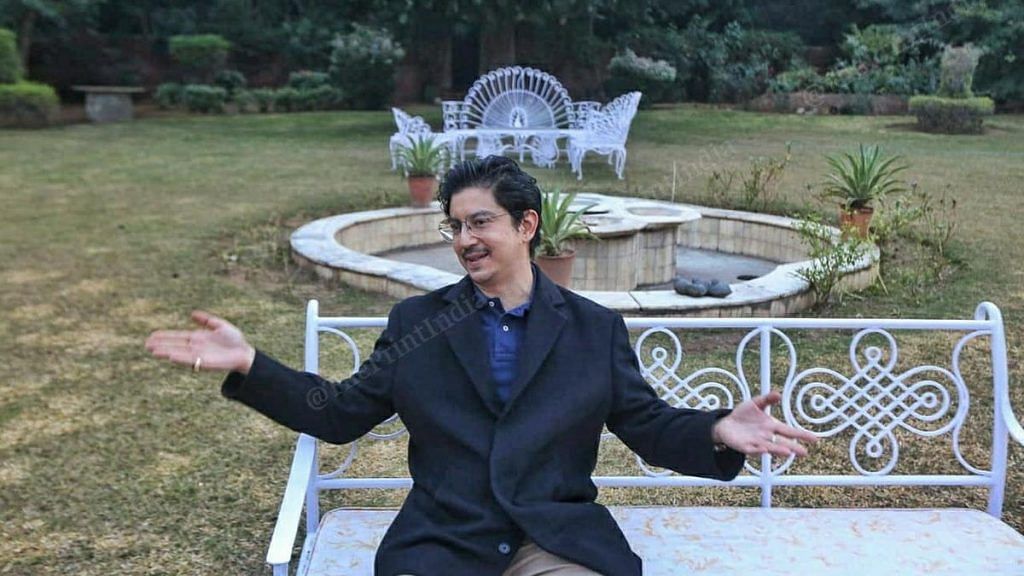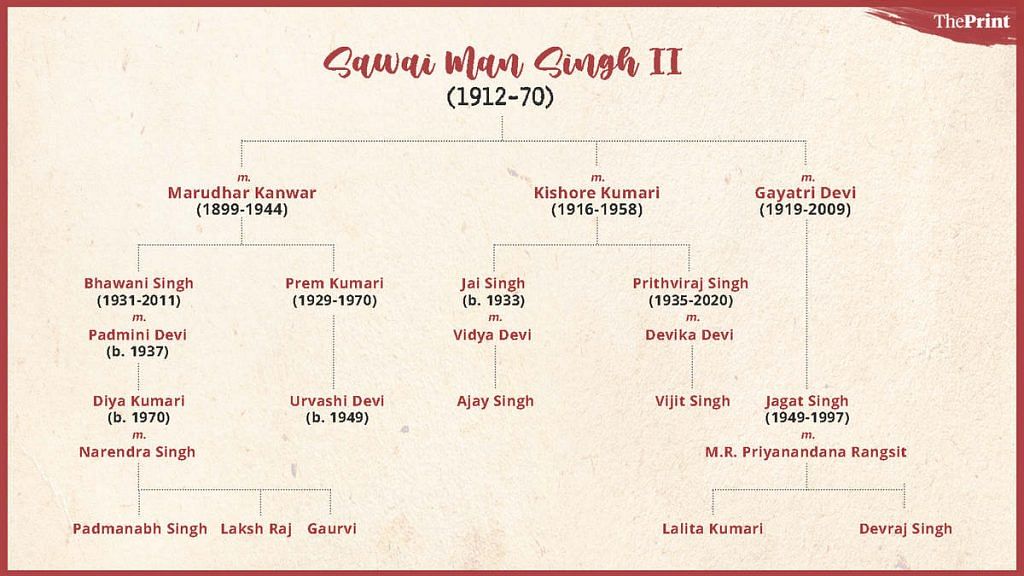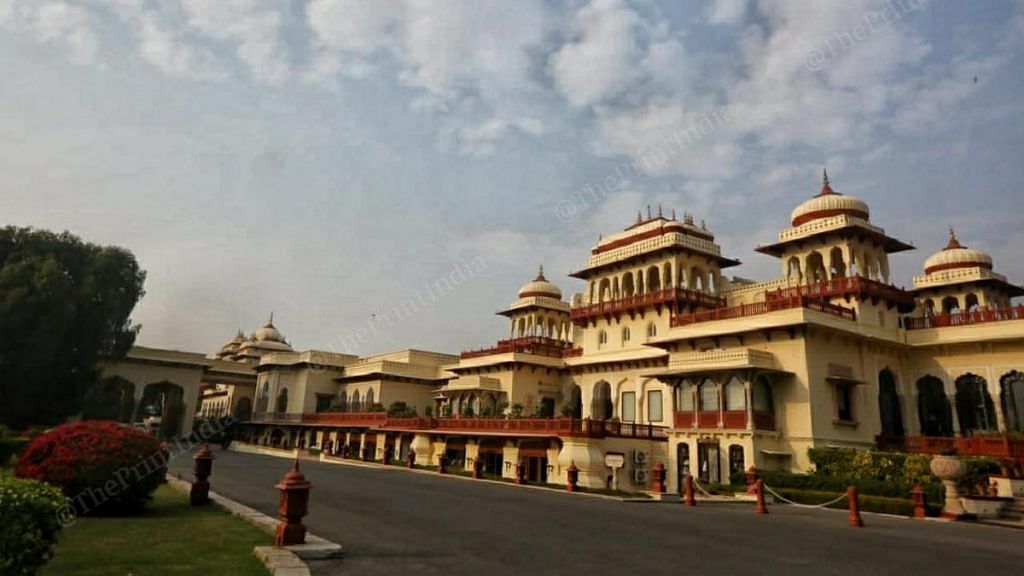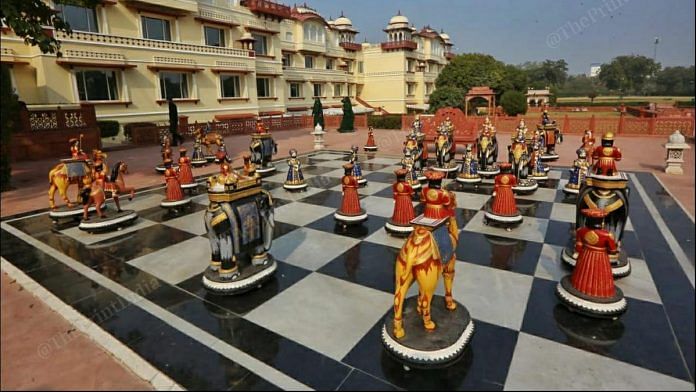Jaipur: Maharaj Devraj Singh has a relaxed air about him as he walks around the grounds of Lily Pool, a palace that was once the residence of his late grandmother Rajmata Gayatri Devi. Dressed in a long black coat thrown over a t-shirt and mustard pants, and sporting colourful Rajasthani mojiris (shoes), he told ThePrint that he is optimistic about the future.
An extended property battle between two branches of the Jaipur royal family has just come to an end, and Devraj is now ready to wave the white flag for his relatives-turned-adversaries.
Earlier this month, through Supreme Court mediation, the long-standing family dispute finally saw a mutually acceptable settlement over two sprawling properties, valued together at around Rs 15,000 crore — Rambagh Palace and Jai Mahal, both currently run as five-star hotels by the Taj Group in Jaipur. A room at either of these heritage properties comes with a hefty price-tag, starting from tens of thousands of rupees per night.
Devraj said income from these properties would help fund his dreams for rural development and heritage conservation in Rajasthan, but also on his list of priorities is repairing broken family relationships.
“I will approach my cousins, even if they don’t approach me. We want to live peacefully together. I want to work together with them, be supportive of them,” Devraj said.

The relatives in question are the children of Prithviraj Singh and Jai Singh, the sons of Maharaja Sawai Man Singh II — the ruler of Jaipur from 1922 to 1947 — and his second wife Maharani Kishore Kanwar.
Devraj Singh and his sister Lalitya Devi are the children of Jagat Singh, the only son of Man Singh II and his third wife Gayatri Devi.
According to the settlement, Devraj and Lalitya will get ownership of Jai Mahal Palace, while their surviving step-uncle Jai Singh and cousin Vijit Singh (son of the late Prithviraj Singh) will retain full ownership of Rambagh Palace. The settlement was reached through a court-appointed mediator — Joseph Kurian, a retired judge of the Supreme Court.
While the settlement has been touted as “amicable”, a lot of bad blood has flowed between the different branches of the family and there are still questions of property ownership left to be unentangled.
For instance, there is still some confusion about Lily Pool. It is located right next to Rambagh, and it is considered by many to be an extension of the palace. Devraj disagrees and says it is his home.
“The matter is sub judice so I won’t be able to delve into the details, but everyone knows that Lily Pool was Rajmata Sahab’s house. It is not a part of Rambagh,” Devraj said.
Also Read: Maharani Gayatri Devi once took on Nehru for the ‘mess’ he made of the 1962 China invasion
The genesis of the feud
Devraj Singh and Lalitya Devi have been fighting a legal battle since 2006 for what they say is their father Jagat Singh’s inheritance, but the feud has much older roots.
According to the book House of Jaipur by historian John Zubrzycki, Man Singh II gifted Jai Mahal Palace (earlier called Natani ka Bagh) to his youngest son Jagat in 1956. In 1981, Jagat and his step-brother Prithviraj set up Jai Mahal Pvt Ltd, with the two of them as directors.
In 1984, they handed the property over to the Taj Group on a 75-year-lease. At that time, Jagat Singh owned 99 per cent of the company with 5,050 shares, while Prithviraj and his son Vijit held less than 1 per cent of the company with 50 shares.

However, the Harrow-educated Jagat Singh had a turbulent personal life and struggled with alcoholism, leaving him unable to focus on business matters. His marriage to the Thai princess Priyanandana Rangsit in 1978 produced two children — Devraj and Lalitya — but the couple separated in the mid-80s.
In 1997, Jagat Singh died at the age of 47 due to complications of alcoholism. “It is unfortunate that my father passed away just as my parents were beginning to mend their relationship,” Devraj told ThePrint.
A financial shock followed a few years later when, in the early 2000s, Priyanandana Rangsit is believed to have made a disturbing discovery.
Zubrzycki’s book says Priyanandana conducted a search of the Registrar of Companies and found that Jagat’s shareholding had been diluted to 7 per cent and Prithviraj and his son now owned 93 per cent of the company. Jagat’s shares in Rambagh Palace Hotel had also been reduced to about 4 per cent from 27 per cent.
While Devraj’s legal team refused to comment on the issue of the alleged share dilution, a source close to the royal family told ThePrint that it appeared to have happened over time.
“Jagat had a drinking problem, and wasn’t thinking straight most of the time. Rajmata Gayatri Devi and Jagat would often sign blank papers and leave them with Prithvi before going on tours abroad. This is how dilution was carried out,” the source alleged.
However, in court proceedings later, Prithviraj said the shares had been diluted to raise loans and expand the activities of the company and that Jagat had attended only 12 of 62 board meetings since the Taj takeover. Prithviraj’s lawyers, according to Zubrzycki’s book, held that this established Jagat’s lack of interest in operating or managing the company.
A contested will
On 30 March 2006, Devraj and Lalitya filed a petition with the Company Law Board and accused Prithviraj and Vijit of “committing illegal and fraudulent acts”.
On 27 April 2006, Prithviraj and Vijit responded that Devraj and Lalitya had no rights over the properties since they were not Indian citizens (Devraj and Lalitya are citizens of Thailand and Britain, respectively, and both hold Overseas Citizens of India, or OCI, cards).
Prithviraj’s legal team also produced a letter in the courtroom that they said was written by Jagat. Dated 23 June 1996, this letter said that Lalitya and Devraj had been cut off from Jagat’s estate entirely, and all his inheritance would be transferred to his mother Gayatri Devi.
While Priyanandana claimed the will was forged, Gayatri Devi stood by it. In an interview with The Indian Express in 2006, she was quoted as saying, “My son made a will and I stand by it.”
However, Gayatri Devi’s relationship with her grandchildren improved in her final years and she eventually changed her stand. In April 2009, just months before her death, she wrote to the board of directors of Jai Mahal Pvt Ltd, transferring her entire shareholding to her grandchildren.
This was not the end of the saga, and Prithviraj’s branch of the family went on to contest Gayatri Devi’s will in a bitter legal battle throughout the 2010s.
What changed?
In 2020, Prithviraj died due to Covid-related complications. According to sources close to the royal family, a settlement wouldn’t have been possible if Prithviraj had still been around.
However, author John Zubrzycki, in an e-mail response to ThePrint, said Prithviraj’s death was unlikely to have been the only factor.
“Prithviraj took on the role of being Gayatri Devi’s financial adviser and he was the person who really took charge of the extended family’s financial dealings. He was also in the box seat of most of the legal disputes concerning property, inheritance, wills etc. His death may have been a contributing factor in this legal settlement but there was also a sense that there was nothing to be gained in endless court battles,” Zubrzycki said.

‘More settlements likely’
Sawai Man Singh II had children with each of his three wives, and the Jaipur royal family is therefore split into three distinct branches.
These families and the state of Rajasthan are currently in a protracted legal battle in a case pending in the Delhi High Court. A case for settlement (Jagat Singh vs Lt Col. Bhawani Singh) has been ongoing in the Delhi High Court since 1986.
According to an attested list of movable properties under schedule one, dated 20 November 1998, seen by ThePrint, 17 properties in and around Jaipur are disputed among the three branches of the Jaipur royal family and the state of Rajasthan.
Outside Jaipur, the properties disputed are Jaipur House in New Delhi, Jaipur House in Mt Abu, and Viman Bhawan in Sawai Madhopur, Rajasthan.
The prominent properties disputed within Jaipur include City Palace (the portion belonging to the Hindu Undivided Family), Raj Mahal Palace, Takht-i-Shahi (popularly known as Moti Doongri Fort), Rambagh Staff Quarters, Amroodo ka Bagh, and Ashok Club.
Among these properties, land that has been acquired by the state are the Staff Quarters at Rambagh, Household Garage and Bungalow No. 37 (Ram Sharan House), and Bungalow No. 36 (Hotel Lakshmi Vilas).
Other than these immovable properties, priceless jewels, artefacts, and other valuables are also currently disputed.
“Nobody has any idea how many jewels and artefacts the royals currently have. In fact, the story is when Rajmata was ill in 2008, the media was told she had been taken to Lily Pool, her residence, but in fact she had been secretly moved to Santokba Durlabhji Hospital,” a source close to the royal family, who claimed to have first-hand information on this incident, said.
“When the commotion was going on, Devraj and Lalitya were locked out of Lily Pool and a certain member of the family, I won’t specify who, smuggled priceless jewellery and artefacts out of the palace.”
When ThePrint contacted Vijit Singh over WhatsApp, he declined to comment. Devraj’s legal team said over phone they would not be able to speak about the ongoing suit in New Delhi. ThePrint also tried to contact City Palace, home to the titular Maharaja Padmanabh Singh, over phone and WhatsApp, but there was no response.
Devraj, however, says more settlements may be reached in 2022. “It is not my plan to contest for more properties, but we’re hoping to see more settlements within the family in 2022,” Devraj said.
(Edited by Asavari Singh)
Also Read: When Hope Cooke, the American socialite wife of Sikkim king, asked for return of Darjeeling



